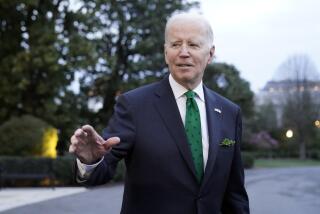House Votes to Curb Ex-President Funds : Proposal for Incremental Cuts Would Lop Off $219,000 Initially
- Share via
WASHINGTON — The House, moving to limit the expenses of former presidents, approved legislation Friday that would gradually reduce federal office and staff allowances for the former chief executives but it stopped short of eliminating the funds.
By a vote of 219 to 130, the House agreed to cut a total of $219,000 from the annual allowances of the three living ex-presidents, leaving $650,000 for office and staff budgets. The vote also provided that the allocations be cut incrementally the longer a President is out of office.
‘A Clear Message’
“I believe we need to send a clear message that our former presidents should not live royally at the taxpayers’ expense,” said Rep. Bill Nelson (D-Fla.), sponsor of the measure, an amendment to a fiscal 1986 Treasury Department appropriations bill expected to be approved next week.
But Nelson said his amendment would not cut the $86,200 federal pensions paid to former Presidents Jimmy Carter, Gerald R. Ford and Richard M. Nixon and the $20,000 paid to Lady Bird Johnson, widow of former President Lyndon B. Johnson. Similarly, Secret Service protection and presidential library expenses would be untouched.
The cuts would hit hardest at Nixon, who resigned in 1974, reducing allowances for his staff and office by $90,000 next year. Ford, who left office in 1977, would lose $86,400, while Carter, President until 1981, would lose $36,400 initially.
The plan to reduce presidential office and staff expenses would provide $300,000 a year for a President’s first four years out of office. At that point, former presidents would receive $250,000 until their ninth year out of office, when the cap would be set permanently at $200,000.
Total assistance for former presidents, including Secret Service protection, pensions and libraries, has grown from $64,000 in 1955 to $26 million in fiscal 1984, Nelson said.
Nevertheless, the House Friday rejected an amendment by Rep. Andrew Jacobs Jr. (D-Ind.) that would have eliminated the entire staff and office allocation. Jacobs argued that Nixon, Ford and Carter could survive the cuts because they earn $25,000 each time they speak on the lecture circuit.
“I don’t know which one is a great orator,” he said. “They’re ornaments, curiosities, someone to have at your convention.”
But John Taylor, administrative assistant for Nixon, said that the former President pays for his own travel and accepts no money for speeches or honorariums, earning income only from his books.
Nixon’s staff already is working to save the government money, Taylor said. “We just gave up $10,000 worth of (office) space that we didn’t have to have,” he noted.
Taylor said it is too soon to tell how the $90,000 cut would affect Nixon’s office.
Opponents of Nelson’s amendment said the former presidents, who continue to act as representatives of the government, carry a difficult workload.
“They are former presidents of this country and, whether we agreed with them or disagreed with them, we have to respect them,” Rep. Guy V. Molinari (R-N.Y.) said.
‘Aspiring Former Presidents’
But Stephanie Sears-Everidge, an aide to Nelson, said that congressmen may have another reason for protecting presidential allowances: “You have a lot of aspiring former presidents in the Senate and the House.”
The House approved similar legislation to restrict allowances last year but the language was dropped by a House-Senate conference committee. A similar Senate bill by Sen. Lawton Chiles (D-Fla.) remains bogged down in committee.
More to Read
Get the L.A. Times Politics newsletter
Deeply reported insights into legislation, politics and policy from Sacramento, Washington and beyond. In your inbox twice per week.
You may occasionally receive promotional content from the Los Angeles Times.









